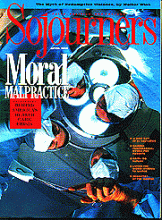The 4,600-foot Guazapa volcano, 15 miles from El Salvador's capital city, grew to be synonymous with military bombing of peasant populations during the 12-year civil war there. Fittingly, it was also the scene of a small but significant gesture of peace just before the agreement between El Salvador's government and the FMLN guerrillas was signed in Mexico City on January 16.
An FMLN commander, invited to that ceremony, emerged from his hideout near Guazapa on the first leg of his journey to Mexico and immediately ran into a National Guard patrol. The guerrilla and the troops faced each other for a long, uneasy moment. Then the officer called out: "I salute you in the name of the National Guard of El Salvador." The commander replied: "I salute you in the name of the Farabundo Marti National Liberation Front." Patrol and rebel then went on their separate ways.
These and many similar incidents, despite enormous doubt, fear, and skepticism, offer signs of hope that the Salvadoran peace agreement will accomplish its stated goal: "The government of El Salvador and the Farabundo Marti National Liberation Front declare that they have reached definitive accords....[Their] execution will put a definitive end to the Salvadoran armed conflict" (from the preamble to the agreement).
In the wake of the accords, El Salvador now will be simply a Third World country instead of a Third World country at war. That is to say, the problems that ignited El Salvador's civil war in the first place largely remain: farmland mostly in the hands of a tightly knit oligarchy; one-fifth of the population controlling two-thirds of the country's wealth; 50 percent unemployment; foreign business reluctant to invest in this ravaged country.
Read the Full Article

